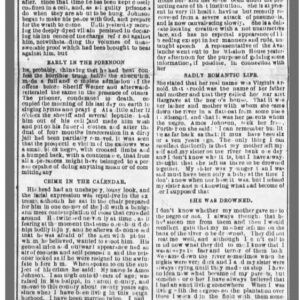calsfoundation@cals.org
Amos Johnson (Execution of)
Amos Johnson was an African American Baptist minister executed on March 25, 1887, in Marion (Crittenden County) after being convicted of raping an eight-year-old white girl who lived in his home.
Margaret Arnold (also called Emiline and Virginia in various news accounts) lived with forty-year-old Amos Johnson, his wife, and his mother-in-law after being abandoned by her parents as a young child. On December 10, 1886, Johnson allegedly assaulted the child and was caught in the act by his wife and her mother, who informed authorities of the crime. He was arrested on December 31, and the Arkansas Gazette reported that “great indignation prevails at Marion over the brute’s conduct and in all probability he will be lynched tonight.” The newspaper stated a few days later that a lynch mob formed, but “it was decided to let the law take its course and if he is not convicted then the citizens will take the law in their own hands.”
Johnson was tried for rape on January 14, 1887, and the child testified “a tale that is unfit for publication,” a Memphis, Tennessee, newspaper reported, adding that “he whipped her severely in order to accomplish his fiendish desires.” Another paper reported that he “forced her on several occasions to submit to his lascivious caresses.” In the end, “the jury returned a verdict in forty minutes to hang Johnson.”
On February 4, 1887, Johnson was sentenced to be executed on March 25, and a Tennessee newspaper wrote that “no less than a dozen persons have been hanged in Marion within the past ten years” (actually, there were four legal hangings and three lynchings in the county prior to Johnson’s death), and thus a hanging “is not much novelty to citizens of Crittenden County,” though “extensive preparations are being made to accommodate the thousands who will be present on the occasion.” The day before the execution, a newspaper wrote that “10,000 people are expected to assemble and watch the death struggles of the criminal as he kicks his way over the river.”
Johnson had maintained his innocence, but on the morning of March 25 he told a reporter that he had never harmed the child except “when I got drunk or pretty near drunk and made her do that for which I am going to be hung today,” adding, “I believe that my punishment is just and I’ve got nobody to blame but myself.”
The condemned man prayed and sang hymns in the jail as he waited to go to the gallows. He was given several shots of whiskey before he was escorted to the scaffold by twelve armed deputies. Johnson recognized several members of his congregation in the crowd and, on the gallows, said, “I done wrong and must be punished for it. I have bought it and must pay for it as I am an honest man and a Christian.” At 1:45 p.m. the sheriff triggered the trap door, and, a newspaper reported, “the crime blackened soul of the ravisher had taken his grain of sand to join the jay birds in the unknown world below.” Johnson’s body gave “a few spasmodic jerks,” and he was declared dead seventeen minutes later.
For additional information:
“The Fatal Fall.” [Memphis] Public Ledger, March 24, 1887, p. 4.
“Fiendish Brute.” Memphis Avalanche, January 15, 1887, p. 1.
“Memphis Matters.” Arkansas Gazette, January 2, 1887, p. 1.
“Memphis Matters.” Arkansas Gazette, January 4, 1887, p. 1.
“A Negro Rapist.” [Nashville] Tennessean, March 24, 1887, p. 1.
“A Parson Hanged.” Memphis Avalanche, March 26, 1887, p. 1.
Mark K. Christ
Central Arkansas Library System







Comments
No comments on this entry yet.